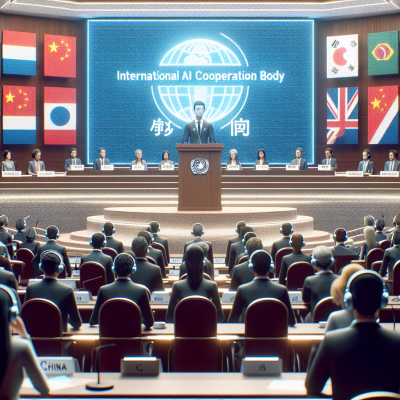
China Proposes Global Cooperation on AI Amid Growing Tech Rivalry
In an increasingly AI-driven world, China has taken a bold step to propose a new international organization aimed at fostering global cooperation on artificial intelligence. This announcement, made on Saturday, signals Beijing’s ambitions to position itself as a global leader in AI governance — offering an alternative model to that of the United States.
Beijing’s Vision: Global AI Rule-Making Through Collaboration
China’s proposal outlines the creation of a new organization dedicated to facilitating international dialogue, setting standards, and promoting the development and deployment of artificial intelligence technologies. The goal is to ensure safety, inclusivity, and mutual benefit from AI innovation across borders.
This move comes amid increasing global scrutiny over the development of AI, especially in light of recent advances in generative AI and concerns over algorithmic bias, misinformation, and autonomous weapons. China’s Ministry of Foreign Affairs emphasized that it is seeking to promote a “fair, just, and non-discriminatory technological ecosystem,” while encouraging countries to share in the benefits and address the shared challenges of AI.
China’s Motivations: An Alternative to U.S.-Led Frameworks
The announcement is widely seen as part of the wider geopolitical battle between China and the United States for technological superiority. As global discourse around AI governance gains momentum, particularly in Western-led forums such as the European Union’s AI Act and U.S. executive orders, China is pushing for a multipolar approach to standard-setting.
By proposing a new organization that includes participation from countries in the Global South and emerging markets, China is aiming to position itself as a voice for developing nations in the global AI conversation. This proposal comes at a crucial time as the Global North increasingly consolidates its own regulatory frameworks.
Key Objectives of the Proposed Organization
While full details of the organization have yet to be clarified, Chinese officials suggest several key objectives that the body would pursue:
- Promote global data sharing: Encourage secure and ethical data exchange mechanisms between AI developers and users across nations.
- Establish international AI safety protocols: Set baseline security standards to prevent misuse and mitigate risks from advanced AI systems.
- Equal access to AI innovation: Ensure that developing nations can leverage AI tools for economic growth, education, and healthcare.
- Respect for sovereignty: Support the development of national AI strategies without external pressure or ideological bias.
AI as a Strategic Asset: A Growing Global Trend
Artificial intelligence is no longer just a technological issue — it’s a matter of national security, economic strategy, and global influence. China’s new initiative aligns with its broader goals of technological self-reliance and the Belt and Road Initiative’s emphasis on digital infrastructure cooperation.
Governments worldwide are increasingly recognizing the need to manage AI’s transformative power. The past year has seen a proliferation of national AI strategies, investment in AI research, and public-private collaboration to define ethical frameworks.
Implications for the Global AI Landscape
If successful, China’s proposed organization could reshape the global AI governance landscape. It might function akin to the International Telecommunication Union (ITU) or even serve as a rival platform to existing Western-led institutions.
This could lead to a fragmented global AI governance model, where competing jurisdictions put forward divergent standards. However, some analysts argue that a diverse range of perspectives may ultimately help create more balanced and inclusive AI norms — avoiding a one-size-fits-all approach.
What Comes Next?
China has yet to reveal a specific timeline or potential founding members of the organization, but experts suggest that Beijing will use upcoming international forums — including BRICS meetings, the UN General Assembly, and the World Internet Conference — to rally support.
The next few months will be pivotal in determining whether the organization gains traction and whether it can engage meaningfully with other international AI initiatives.
Conclusion
China’s push to create a global cooperation framework for artificial intelligence reflects its growing confidence and long-term ambitions in AI leadership. As global stakeholders grapple with the sociopolitical and ethical implications of AI, China’s proposal adds a new layer to the complex, evolving international dialogue.
While the initiative is still in its infancy, it underscores the urgent need for inclusive and multilateral approaches to AI policy. Whether this vision gains broad international acceptance — or further deepens the divide between competing AI powers — remains to be seen.
Stay tuned as we continue to follow developments in this critical space for the future of technology and society.


Leave a Reply